With 5.24 billion users in 2025, social media is much more than just a platform for sharing images and videos. It helps many professionals grow – doctors are no exception. Social media for doctors has emerged as a robust tool for growing their medical practices while building trust and credibility.
The majority of patients of late search doctors online. They go through reviews, ratings, etc. to get an idea about the standard and quality of the treatment. Once they find everything satisfactory, they then book an appointment online and go for treatment.
Doctors or even medical students must leverage leading social media sites such as Facebook, Instagram, LinkedIn, and others to excel in their social media presence. It helps them grab a plethora of opportunities to serve more patients.
We will discuss everything about social media marketing for doctors, be it importance, benefits, needs, etc. So, keep reading the entire post.
What is Social Media for Doctors?
Social media for doctors or medical students is about leveraging various social media sites to interact and engage with patients. It facilitates doctors to share medical knowledge and actively promote many health-related services.
Doctors target most commonly top social media sites for many other purposes as well, including developing professional social networks, helping the public with various health issues, and sharing information regarding various medical achievements.
To use social media platforms, it’s essential to follow several ethical guidelines, privacy regulations, professionalism, and more. Doctors should ensure that the content that they share on social media platforms should be respectful, accurate, and confidential. They should avoid sharing medical advice that is prone to be misinterpreted.
Why Social Media is Important for Doctors?
Social media plays a vital role for doctors to boost patient engagement, and create trust, and knowledge. Doctors get a chance to build authority and thus develop a robust social media presence by sharing important health tips, crucial medical information, the latest research, and more.
Social platforms bring the possibility of direct interaction with patients by resolving their queries and also offering necessary care and support. Apart from this, social media improves medical community building and awareness of many health issues.
Doctors can use their professional social media accounts to promote their medical profession, connect with colleagues, and gather the latest information regarding medical advancements. Meanwhile, it’s crucial to maintain a full professionalism to ensure a full privacy for patients while leveraging social media for these purposes.
What are the Best Social Media Strategies for Doctors?
Doctors need to follow the right strategies for using social media to harness its maximum advantages. Following are some of the top strategies that every doctor should follow;
1. Create a Professional Social Media Presence
The first and most important step for any doctor is to focus on building a professional social media presence. It involves creating profiles that should be credible, informative, and reflect their qualifications and experience.
Make sure your bio consists of necessary information including areas of specialization, medical credentials, office contact details, and more. It’s crucial to ensure your content is highly consistent across multiple platforms, with a fully professional picture. It should include a complete description of your profession as well.
You should always keep in mind that privacy concern is something that is involved with healthcare. It’s advisable not to share any patient-related information unless you have their consent. Instead, you can share industry needs, evidence-proof health tips, latest updates matching your expertise and values.
2. Engage your Audience
Engagement is crucial when it comes to developing a community across your medical presence. You can engage with your followers by responding to their comments, joining relevant conversations, liking posts, etc.
You can’t use social media just for broadcasting information but also to create meaningful interaction as well. You need to be approachable and responsive to be credible and thus expand your professional social network.
Conducting a live Q&A session is one of the proven methods of engaging with your audience. Make sure it is focused on common health issues or also many latest medical trends. It allows your followers to raise their questions directly. Doing this helps you showcase your expertise as well. On the other hand, it also builds your rapport with patients.
3. Use Reviews and Patient Testimonials
You need to be aware of the role of testimonials and patient reviews when it comes to creating trust and credibility. Positive feedback is helpful for potential patients who feel confident in selecting your actual healthcare needs.
It’s advisable to prompt satisfied customers to write feedback for you. You can post the same on your social media profiles or many other reliable platforms such as Google My Business, and others.
Besides, you can also highlight your testimonials in social media posts as well. These testimonials give an idea to even other patients about your strength. You should always keep in mind the confidentiality of your patients.
Make sure you don’t post any testimonials or reviews without the actual consent of patients. It’s also a good idea to post success stories, achievements of your patients, and more to showcase your services.
4. Address Patient Queries
The majority of patients often access social media platforms to gather necessary medical advice, recommendations, and more. All you need to do is to address these important queries. These can help you create a trusted resource.
It’s advisable to create medical education content that can resolve many common health concerns that should be related to your specialization. For instance, a cardiologist can post about heart health tips.
When you address general queries on social media, you need to ensure it’s quite beneficial. You can always remind your audience that social media is not capable of replacing any personalized medical consultations.
5. Consistent Content Creation
The next important social media strategy that you should adopt is to maintain consistency in content creation. You need to post regularly to keep yourself in the mind of your followers. You should remember the fact that a consistent posting is not about posting the bulk of even irrelevant content to your audience. It will certainly not help you in any way.
You should focus on providing value to your audience by sharing relevant content that is related to your niche. It should be avoidable to produce long-form content daily. Several important tips, brief comments, or links to many trusted resources on the latest medical news can be indeed the most important form of content.
It’s indeed a good idea to use a calendar to plan and schedule your posts. Make sure it’s a perfectly balanced combination of promotional, medical education, personal content, and more.
Related Post: Content Marketing for Doctors: How to Engage Patients Online?
6. Set a Goal
Before you enter into social media marketing, it’s pivotal to set clear and measurable goals. These can range from maximizing patient appointments to increasing your follower count or can also boost engagement with your posts. Having a clear goal lets you put your efforts in the right direction.
For instance, if your main goal is to maximize awareness about any specific health issue, you can make your campaign around the same. You can determine its success through different engagement metrics such as likes, comments, and shares.
Moreover, if you endeavor to create patient trust, you can focus on sharing complete educational content and then monitor your feedback accordingly. It’s a great idea to set your goal. It will help you keep your social media strategy aligned perfectly with the core objective of your medical profession.
7. Share Patient-Centric Stories
Stories are a great way to catch the attention of people. Sharing these stories helps you humanize your medical practice. However, it’s quite necessary to respect patient confidentiality and share stories only with their consent.
You need to keep in mind that patient success stories play a vital role to inspire others and encourage them to get care. These stories can improve emotional connections with your patients.
Sharing stories about challenges, your medical journey, or professional experience helps potential patients relate to you as an individual, not only as a medical professional.
How to Select the Right Platform for Social Media for Doctors?
With the availability of a variety of platforms, choosing the right one can certainly be a decisive step. To choose the right platform, you need to be familiar with your audience, objectives, and features of every platform. Let’s explore all these factors in detail.
1. Define your Goal
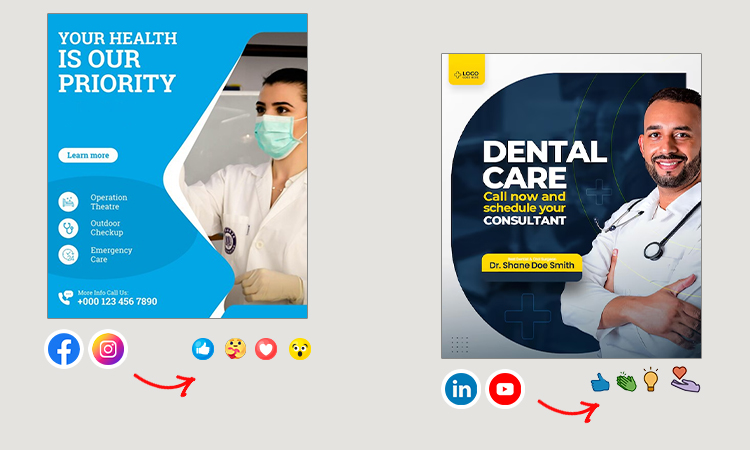
The first step in choosing the perfect platform is to define your social media goals clearly. If you are seeking to maximize brand awareness, you can educate the public, engage with patients, or promote your services such as specialized treatment programs. You need to keep in mind that every goal needs a different approach and also a different platform. Let’s explore this in detail.
a. Brand Awareness
If your main aim is to increase brand awareness, you can target platforms such as Facebook, Instagram, Twitter, and many others. These can be a perfect option since they allow a higher exposure and indeed frequent interaction.
b. Patient Education
If your major focus is to educate patients about medical conditions, preventive care, or treatments, you can target platforms such as LinkedIn and YouTube. These platforms are apt for sharing in-depth videos and also many professional articles for patient education.
c. Engagement and Relationship Building
You can consider many platforms such as Twitter, Facebook, and others when it comes to direct engagement with patients. They allow you to respond directly to inquiries and also can participate in many health-related conversations.
2. Know your Target Audience
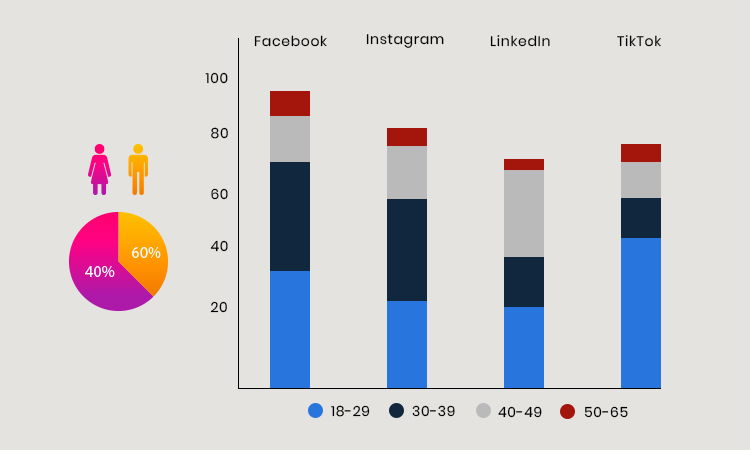
As mentioned above, you need to have in-depth information regarding your target audience. It definitely helps you select the right platform where the majority of your patients are active. You need to keep in mind the demographics of users of the platform and determine how they align perfectly with your ideal patients.
a. Facebook
Facebook enjoys having a vast user base from different age groups. It is a perfect platform for targeting a wide audience, including older adults, parents, and those who seek general healthcare details.
b. Instagram
If you seek to target a younger demographic, Instagram can indeed be the right platform for you. It’s the best platform to target GenZ and millennials. If you offer cosmetics treatment, Instagram lets you showcase your offerings in a better way. It includes a visual nature that lets you highlight before-and-after transformation, health tips, and patient success stories.
c. LinkedIn
LinkedIn is a perfect choice to connect professionals with many other medical professionals. It’s a perfect option for doctors who seek to share thoughts and articles based on medical advancements.
d. TikTok
If you want to target a younger audience with educational and entertaining content, you can target none other platform than TikTok.
3. Match Content Types to Platform
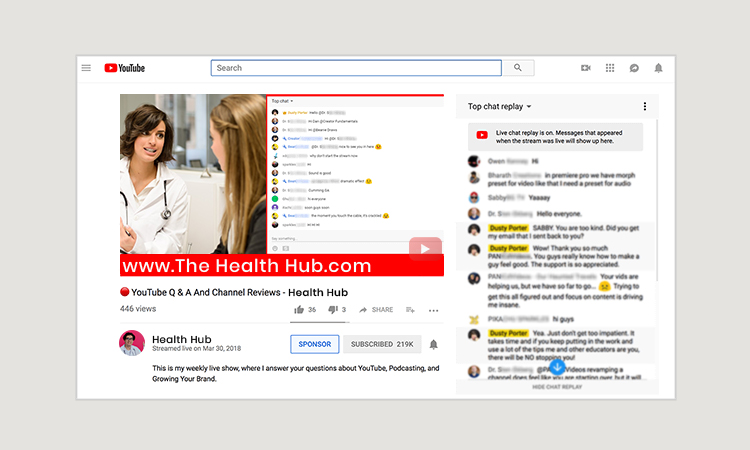
You need to keep in mind that different platforms are apt for different types of content. It’s necessary to align your content style based on the platform’s strengths to ensure proper delivery of your messages.
a. Visual Content
Platforms like Pinterest and Instagram are a perfect choice for visual storytelling. Be it sharing success stories, behind the scenes of your practices, or infographics, these platforms are a perfect choice.
b. Long-Form Articles and Thoughts
Facebook and LinkedIn are a perfect option for blogs or in-depth articles about research, medical trends, advice, etc.
c. Video Content
If you are in search of the right platform to post long-form video content, you can target none other than YouTube. You can post a variety of content, including webinars, tutorials, patient testimonials, etc.
For short videos, you can target Instagram Stories and TikTok. These are perfect for effective and quick tips, that display your personality, or offer various health tips.
d. Live Interaction
Many platforms such as Instagram, Facebook, and YouTube allow live streaming. It’s indeed the most effective way for doctors to conduct Q&A sessions, live surgeries, virtual consultations, and more. It thus fosters a deeper engagement.
4. Implement Privacy and Compliance
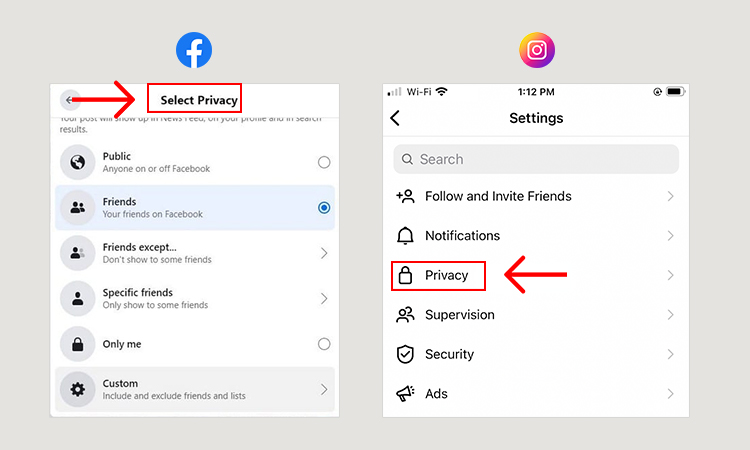
As we already mentioned above, doctors should follow strict privacy and compliance, including the Health Insurance Portability and Accountability Act (HIPAA). Make sure that the platform you select aligns perfectly with your privacy standards, especially when you share patient information or engage in online consultations.
a. Avoid Sharing Personal Health Information
Irrespective of the platform, you can refrain from posting personal health information. You should also avoid sharing any specific cases related to patients without their consent.
b. Secure Communication Channels
Many platforms provide private messaging features that can comply perfectly with healthcare data security standards. You can seek platforms that include secure communication options if you wish to interact with patients with the help of messages.
c. Privacy Settings
You need to be familiar with privacy settings that are available on every platform. So, you need to use privacy settings properly, which helps you control who can access your posts.
5. Determine Platform Features
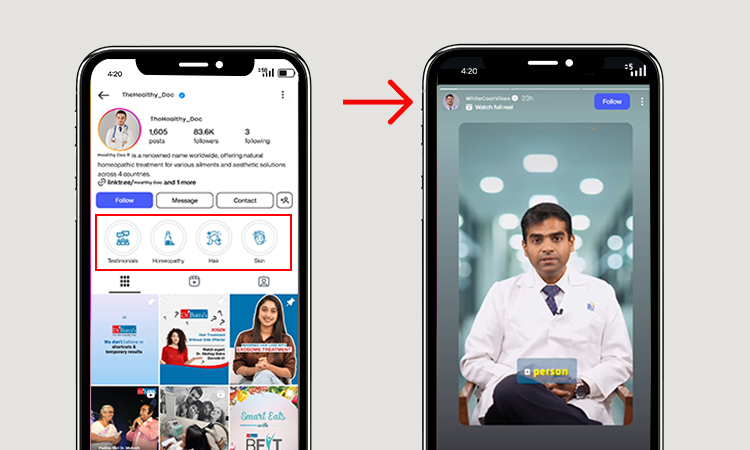
There are different platforms that include multiple features, which play an important role in achieving your social media goals. You can determine many tools that every platform includes and find out whether they support your content strategy perfectly.
a. Instagram’s Stories and Highlights
It’s the right option to share quick updates, snippets, or patient reviews of health advice that can disappear after 24 hours.
b. Facebook Groups
It’s perfect for creating patient communities or also creating discussion forums around several specific health conditions.
c. Twitter Threads
It’s a good option to share important tips and, the latest news, or also engage in real-time conversations with your followers.
While selecting the platform, you need to ensure that it offers many tools that can complement the content type and also frequency you plan to post.
6. Get Details About Competitor’s Activity
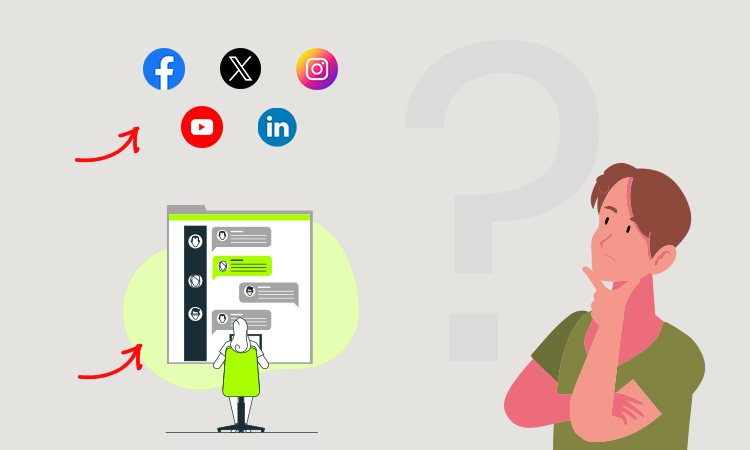
You need to perform complete research work to find what practices or other doctors do on social media to get important insights. It’s crucial to pay complete attention to the following things;
a. Which Platforms They Use?
You can find out where your competitors are active and also engage with their audience. It can reflect which platforms work perfectly for your type of practice.
b. What Type of Content They Share
You can observe the type of content that gets a higher use engagement, be it patient success stories, informative posts, or interactive Q&A sessions.
You need to be aware of your competitor’s social media activity which can help you redefine your social media strategy completely. It also helps you decide the right platform for your practice.
Reasons Why Social Media for Doctors Is Essential
Social media for doctors offices is necessary for many reasons for creating a healthy relationship with patients, establishing credibility in their field, boosting visibility, and more. Following are some of the top reasons why social media is necessary for doctors.
1. Boost Visibility
One of the major advantages of social media is its capability to improve your visibility. Patients can turn to many platforms such as Instagram, Facebook, LinkedIn, and Twitter to search for many healthcare providers, gather information, and read reviews about medical conditions.
Doctors can maintain active social media accounts on these platforms to ensure that their practices are easily discoverable. Social media is helpful for many doctors who want to maximize their reach even beyond local referrals, which lets them connect with a wider audience. Posting relevant content daily lets you boost your online visibility and makes your potential patients discover your expertise easily.
2. Increase Patient Knowledge and Engagement
Social media is indeed an outstanding platform to educate patients and improve their engagement. Doctors can leverage these platforms to share wellness advice, health tips, and preventive care information; enlighten their patients, and more. These indeed help them make informed decisions related to their health.
Much educational content, including blog posts, infographics, videos, etc., can indeed simplify complex medical topics. It can offer important knowledge. You can engage with patients in several ways, which lets you create a sense of community and encourages patients to take an active role in their healthcare.
3. Build Trust and Relationships
Building trust is one of the most tried and tested medical practices. Social media offers a great opportunity for doctors to create trust and thus strengthen their relationships with many patients.
Doctors can share their authentic content, showcase their expertise, personal stories, etc. to seek the attention of patients and communicate with their patients. It’s important to engage with followers on a regular basis on these platforms to make your connection strong. It works effectively to strengthen the relationship between doctors and patients.
4. Promotion of your Practices
Social media acts as an impeccable marketing tool to promote your clinical practices and entice potential patients. Doctors need to use these platforms to promote many special offers, newly launched services, etc.
It helps them promote many new aspects of their services, including patient-friendly care, advanced technologies, specific treatment areas, and more. In addition, sharing success stories and patient testimonials works as a great social.
It encourages many new patients to create trust and need care from the necessary practices. Social media advertisements ensure targeted marketing, which ensures promotional content reaches the right audience based on interests, location, and demographics.
5. Boost Credibility and Authority
Social media offers doctors an excellent chance to portray themselves as a reliable source of verified information. They can increase their credibility by participating in many health-related discussions, and evidence-based medical content, and responding to many current health trends.
They can post well-researched content as a doctor to build authority on their horizon. They can differentiate themselves from their competitors by providing the most important and accurate health advice. They can get respect and affection from their communities, whether it’s offline or online.
6. Increase Accessibility
Social media improves the full of accessibility of medical professionals. It allows doctors to ensure their availability to a wider audience by giving them the ability to share their contact details services, and location on social platforms.
Patients find it easy to connect with them with the help of comments, messages, and many video consultations. It’s indeed advantageous for those in many underserved and rural areas.
Doctors can maintain their strong social media presence to answer many general health questions, direct patients, and share useful advice to the right channels for further consultation. This kind of accessibility is indeed useful to maximize patient outcomes since people have easy access to reliable medical information.
7. Increase Awareness for Public Health
As mentioned above, social media is the right platform to use for increasing public awareness about many health issues. A Healthcare professional can leverage their social media profiles to share the latest research, wellness tips, preventive measures, and many more to a wider audience.
Doctors can use social media platforms to spread different types of public awareness, whether it is the importance of vaccinations, offering necessary updates during health crises, or increasing awareness about chronic conditions.
The widespread reach is indeed pivotal for disseminating crucial health messages quickly and also with higher efficiency. It can indeed help improve many community health outcomes.
8. Create a Personal Brand
Creating a personal brand is something that is of great importance for doctors who wish to build trust and credibility with their patients. With the help of social media, medical professionals can highlight their expertise, engage in discussions on relevant media topics, share patient testimonials, and more.
Daily interactions and updates let doctors present themselves as thought leaders on their horizon, which boosts their reputation as experts. An active social media presence can help doctors stand apart from their competitors and help them connect with their patients. It increases patient loyalty and thus boosts professional reputation.
9. Maximize Networking Opportunities
Another advantage that doctors can avail of by using social media is it brings endless opportunities for social media networking for doctors. It lets them connect with many other healthcare professionals, organizations, and industry leaders.
Platforms like LinkedIn allow doctors to exchange knowledge, connect with colleagues, and collaborate with many professionals. Social networking also brings excellent chances for doctors to attend webinars, virtual conferences, online workshops, etc. It works great for education and career development.
Another important advantage of social networking is it allows doctors to be an active part of their community and participate in discussions actively. It further gives them opportunities to share important details, learn from peers, and stay updated with medical innovations.
In this way, social networking brings opportunities for professional growth and keeps doctors informed about various best practices, industry trends, and medical innovations.
10. Promote Clinics and Services
The better way to entice new patients is by leveraging many social media platforms for promotions of clinics and services. With the number of active users across different platforms such as LinkedIn, Facebook, Instagram, and more, doctors can make their presence among millions of patients easily.
They can share virtual tours and of course informative content to skyrocket their online visibility. Doing this lets them promote their specialization, clinics, amenities, etc., most effectively. It encourages patients to visit their clinics and thus doctors get a chance to serve more patients.
11. Crisis Management and Communication
Social media is a robust platform for crisis management and communication. In case of any emergencies, doctors can immediately take action to provide necessary updates on time.
They can leverage social media platforms to communicate even during the crisis to create trust with both the community and patients. It ensures people turn to genuine sources for detailed and accurate information.
Social media enables doctors to address patients’ concerns immediately, manage their reputations, and clarify any misconceptions by providing direct responses to their criticism and concerns.
12. Improve Patient Care
Doctors can harness the advantages of social media as an educational tool, which indeed enhances patient care. They can share many informative materials such as treatment options, tips for a healthy lifestyle, and healthcare news.
With this, doctors can empower their patients and help them stay healthy and fit. It helps the patient make an informed decision related to their health. Many platforms such as Instagram and YouTube are apt for sharing short videos that explain complete procedures or displaying patient testimonials.
This kind of engagement improves doctor and patient relationship and thus encourages patients to play an active role when it comes to managing their health. Apart from this, active online engagement minimizes the necessity of in-person visits.
13. Cost-Effective Marketing
The fact can’t be denied that the traditional form of marketing is expensive, whether it’s TV ads, print media, or others. Whether you are an individual doctor or a group of organizations, you need to invest heavily when you opt for this form of marketing.
Quite the contrary, social media marketing is highly affordable, especially when compared to traditional forms of marketing. Apart from being cost-effective, it allows doctors to maximize their reach among a vast group of audience with minimum effort and cost.
Another advantage of social media marketing is it allows doctors to target specific demography based on age, location, medical needs, and interests. By investing in paid social ads and organic content, doctors find it easy to maintain a consistent marketing presence even without investing more.
This cost-effective approach is beneficial for many new practices or even those who are solo practitioners seeking to increase their patient base.
Related Post: Facebook Ads for Doctors: Get More Leads and Grow Your Practice Online
Some Social Media Challenges for Doctors
Apart from various opportunities, doctors quite often come across many challenges as well. We have discussed below some of the most common challenges that doctors need to deal with most carefully.
1. Maintain Patient Confidentiality
While talking about the various challenges of using social media, it’s wise to start by maintaining patient confidentiality. As we already mentioned above, healthcare professionals need to follow necessary regulations like HIPAA, especially in the US, which makes it essential that personal health information is private.
Any harmless post can breach confidentiality. So, doctors must check information regarding their patients. They should publish only after getting the final permission from their patients. Of course, they can post general advice. However, they should always avoid mentioning the personal details of any of their patients.
2. Manage Negative Comments
Another challenge that doctors come across is managing negative comments. Not to forget, negative comments can spoil your reputation as a doctor. So, managing these comments in a better way is quite necessary.
You need to understand that social media platforms enable anyone to leave their feedback. These can be sometimes negative as well. Whenever you get any negative comments from any of your disappointed patients, you can respond to them professionally.
It’s essential to avoid negative feedback as much as possible. You should always avoid overreacting as it can damage your reputation. It’s necessary to strike a perfect balance and then respond with a higher empathy. You can focus on resolving many important issues, which are indeed crucial to maintaining reliability.
3. Balancing Approachability and Professionalism
Doctors should always be approachable to their followers and patients on social media. But, they also maintain a greater level of professionalism. Social media provides an opportunity for doctors and lets them engage in informal.
They should have friendly interaction. But, doctors should do all these without compromising their professional image. It’s always a good idea to maintain a perfect balance between maintaining authority and being relatable as a doctor is indeed challenging.
Participating in any controversial topics and sharing personal opinions creates huge complications when it comes to maintaining a professional reputation. A well-crafted social media presence is useful to convey a greater sense of accessibility and expertise.
4. Trolling
Sometimes doctors face trolling, which can be frustrating for them. Patients quite often post derogatory feedback with the major intention of provoking a reaction. It can be emotionally draining for doctors as well and they often find it difficult to manage.
They need to be familiar in terms of how to deal with trolling without falling into any unnecessary conflict. The best way to deal is by ignoring these comments. They can also block those users who post these kinds of comments.
Meanwhile, doctors must create clear guidelines in terms of how they can handle these kinds of situations publically. Doctors need to ignore escalating any kind of conflict and thus can preserve their repo.
5. Misinformation and Misinterpretation
Misinformation or misinterpretation is another common challenge that doctors often come across while leveraging a social media platform. These platforms are flooded with many unverified health information, claims, etc. So, it creates difficulty for patients to differentiate between false and reliable sources.
Doctors should be responsible for sharing evidence-based information that should be accurate. But, doing it needs complete vigilance. Apart from this, medical advice shared online can also be misinterpreted. It leads to confusion and also can be harmful.
Doctors should advise that any kind of shared guidance on social media is well-established and clear. Besides, they need to ensure it’s tailored to a general audience as well.
Hire a Professional Social Media Agency to Improve your Boost your Social Profile
It’s indeed a decisive step to hire a professional healthcare social media marketing agency that can work on your behalf to boost your social media profile. They work everything with a proper strategy tailored to improve your presence, create trust, and showcase your expertise. It can attract and engage patients to a larger extent.
They target many popular social media platforms based on your target audience. The agencies help ensure top-quality and consistent posts that resonate with the audience. They help you stay updated with the latest algorithms and trends, which increase your reach.
You can always hire a professional social media agency that can help you in patient care while they improve your online presence and your practice. You can select their packages based on your budget.
FAQs
Doctors use social media to get several benefits including sharing medical knowledge, improving online presence, engaging with patients, and more. Social media helps doctors create trust, stay updated with advanced medical research, and promote health awareness. With social media, doctors can connect with colleagues and expand their professional network. It increases their continuous learning and collaboration.
Healthcare professionals can use social media in the clinical process to engage with patients, promote healthcare wellness, build trust, and more. They can provide accurate information and answer many common questions creating a complete supportive online community. They can improve patient care, enhance patient communication, and increase awareness about services.
Well, the cost of running a social media campaign for doctors is something that ranges from $700 to $7,000 on a monthly basis. It also depends on many factors such as platform, scope, target audience, and more.
The cost of running campaigns for doctors varies based on the scope, platform, and target audience. On average, fees can range from $500 to $5,000 per month. Smaller practices may pay less, while larger ones or specialized services may spend more for advanced strategies, including content creation, ads, and performance tracking.
Conclusion
You can get all the most promising advantages of social media to grow your practices only if you use it with a proper strategy. It’s crucial to decide on the right platforms where the majority of your target audiences are active.
Once you find it, you can chalk out the right strategy around them. Make sure you go through the social media strategy of your competitors or other doctors. Try to find out what works well and what not. This will help you move in the right direction and get the desired outcomes.
Additional Resources:



























